

August 29, 2022
Why custom software is better than off-the-shelf?
When deciding between custom software development and off-the-shelf solutions, it can be challenging to figure out how to make the best choice for your organization. Whether you’re looking for a new solution or replacing an existing system, understanding the pros and cons of each option will help you make an informed decision that fits your business needs.
This blog post will outline the key factors you should consider when weighing up custom software development vs. off-the-shelf solutions, and provide guidance on how to make the best choice for your organization.
What Is Custom Software Development And Off-The-Shelf Solutions
Custom software development refers to the process of creating software applications or solutions specifically tailored to meet the unique requirements of a particular business or organization. It involves designing, coding, testing, and deploying software systems that are built from scratch, taking into account the specific needs, preferences, and workflows of the client. Custom software development offers a high level of flexibility and allows businesses to have full control over the features, functionality, and user experience of the software.
Off-the-shelf solutions, also known as commercial off-the-shelf (COTS) software, are pre-packaged software applications or solutions that are readily available and designed to address common needs across multiple industries or businesses. These software products are developed by third-party vendors and are generally mass-produced to cater to a wide range of customers. Off-the-shelf solutions are often sold as licenses or subscriptions and can be easily implemented by businesses without the need for extensive customization or development. They offer a quicker and more cost-effective solution compared to custom software development, as they are already developed and tested.
Why Is It Important To Understand The Difference Between The Two?
Understanding the difference between custom software development and off-the-shelf solutions is important for several reasons:
Meeting specific requirements: Custom software development allows businesses to address their unique and specific needs. By understanding this option, businesses can determine whether their requirements are sufficiently unique to warrant the investment in custom development or if they can be met by an off-the-shelf solution.
Flexibility and customization: High levels of customization and flexibility are provided by custom software development. Businesses are given total control over the software’s features, operation, and user interface. Businesses can determine whether their requirements demand this level of control or whether an off-the-shelf product can sufficiently suit their needs by recognizing this distinction.
Cost and time considerations: Custom software development generally requires more time and financial investment compared to implementing off-the-shelf solutions. Understanding this difference helps businesses make informed decisions based on their budget constraints and timeframes. They can evaluate whether the benefits of custom software development outweigh the costs or if an off-the-shelf solution provides a more cost-effective and timely option.
Scalability and future growth: When opposed to using pre-made solutions, custom software development typically needs more time and money. Knowing the difference enables organizations to decide wisely based on their financial limitations and time constraints. They can assess whether the advantages of developing custom software exceed the costs or if a ready-made solution offers a more affordable and timely alternative.
Support and maintenance: Future scalability and growth can be accommodated through the construction of custom software. It is simple to modify and expand as the business grows. Off-the-shelf solutions, on the other hand, could not be as scalable and might require more customization or integration work to accommodate shifting business requirements. Knowing the difference enables firms to prepare for long-term expansion and make sure their software solutions are scalable.
Overall, understanding the difference between custom software development and off-the-shelf solutions enables businesses to make informed decisions about the most suitable approach for their software needs. It helps them align their requirements, budget, timeframes, and future growth plans to select the option that best fits their specific circumstances.

Advantages Of Custom Software Development
-
Tailored to Specific Needs and Requirements
With custom software development, businesses can have software solutions that are tailored to their specific needs. This is one of the primary benefits of custom software development. By building the software from scratch, developers are able to take into account the workflows, processes, and preferences of the business. This guarantees that the software will align with every aspect of the organization, resulting in enhanced efficiency and productivity.
-
Quality Assurance
The control over the quality of the final product is enhanced by custom software development. Throughout the development process, industry best practices can be followed, rigorous testing can be carried out, and quality assurance measures can be put into place by development teams. The result is software that performs optimally, is more secure, and is more dependable, meeting the organization’s expectations and requirements at a higher level.
-
Scalability
Scalability can be incorporated into the design of custom software solutions, enabling companies to prepare for development and growth in the future. The software architecture can be created by development teams in a modular and adaptable way, which makes it simpler to add new features, functionality, or integration with other systems as the business develops. Custom software offers the ability to scale and adapt to the shifting needs of the organization.
-
Integration with Existing Systems
Custom software development offers the advantage of seamless integration with existing systems and infrastructure. Development teams can make sure that the software works well with databases, third-party systems, and other software applications that the company uses. This integration capability improves operational efficiency by streamlining workflows, removing data silos, and integrating disparate systems.
Advantages Of Off-The-Shelf Solutions
-
Cost Savings
Downfall in expenses is among the principal benefits of selecting off-the-shelf alternatives. These solutions are tailored for a broad spectrum of clients, which means the expenses related to creating them are split among numerous customers. This results in off-the-shelf options being more economical in comparison to custom software design which often requires an immense amount of resources, effort and money to develop. In addition, off-the-shelf alternatives typically have less expensive opening costs as they are commonly traded through licenses or subscriptions, thus granting businesses entry to the software at a small fraction of the price of custom designs.
-
Quicker Setup and Implementation Period
Off-the-shelf solutions, are a convenient option for businesses seeking a hassle-free approach to implementation. These ready-to-go solutions offer pre-built features and functionalities, which can accelerate the development process by reducing the time and effort involved in custom software development. On the other hand, custom software development involves designing, coding, testing, and deploying a solution from scratch, consuming more time and effort than off-the-shelf options.
-
Industry Standard Features
Industry standards and best practices are frequently used as the foundation for off-the-shelf solutions. They include a selection of capabilities and features that have been employed extensively and successfully in the sector. Businesses can take advantage of these industry-standard characteristics by using an off-the-shelf solution without the requirement for custom development. This can give their operations a strong foundation and enable them to maintain competitiveness in their particular industries.
Considerations When Making The Decision
The Company’s Budget
When choosing between off-the-shelf and customized software, the company’s budget is a major factor to consider. Adjusting to tailor-made software usually requires a larger monetary investment as a result of its intricate development process.
Conversely, pre-made solutions are often a less expensive alternative, ideal for smaller businesses residing in limited-budget areas. It is important to evaluate financial resources and assign budgets for software solutions to make an educated, cost-effective decision.
Time vs. Quality
Coding software from scratch involves designing, coding, testing, and deployment which, when weighed against quality, is an important consideration. Though time will be expended, the benefit is that the system can be customized to a greater extent and will have a higher quality.
Ready-made solutions, on the flip side, offer speedy implementation as they are already created and accessible. However, they may not fully meet the unique requirements of the business. Assessing the importance of time constraints and the required level of quality and customization is essential in making the decision.
Long-Term Goals and Vision
When choosing between custom software development and commercially available solutions, it is essential to take the company’s long-term objectives and vision into account. Custom software development enables companies to create software that perfectly matches their long-term goals and expansion strategies. Scalability and flexibility for future demands are provided. While off-the-shelf solutions have immediate advantages, they might not be as adaptable or configurable for long-term objectives. Making the best choice involves evaluating the company’s vision and evaluating how well each alternative matches it.
Support and Maintenance
Consideration should be given to the support and maintenance aspects of the software. Custom software development often requires ongoing support from the development team, which may involve additional costs. In contrast, off-the-shelf solutions typically come with vendor support and regular updates. Assessing the level of support required, the availability of resources for maintenance, and the reliability of vendor support is essential in making an informed decision.
You can choose the option that best satisfies your company’s objectives by considering these aspects and weighing the benefits and drawbacks of off-the-shelf solutions and custom software development. Considerations such as your budget, time restrictions, long-term goals, particular requirements, support requirements, and integration needs should all be considered when making the decision.
If your business has generic requirements, off-the-shelf products may be suitable. However, if you have specific custom requirements and aim to provide your clients with innovative solutions that offer value for their investment, custom software development is the recommended choice.







